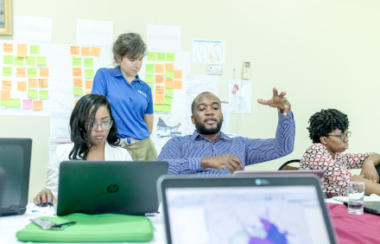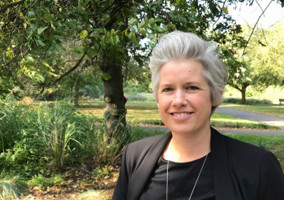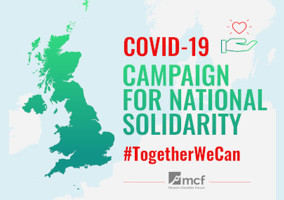The biggest challenge for us has been how to adapt our model so that we can work remotely and still provide useful services.
At present we have a team of about 70 volunteers, who are all recruited to a tight specification: for their technical skills, their leadership experience, their ability to work in difficult circumstances, and their team-player ability. Typically, in a callout, we would have a team of two or three people travel to a country to help provide mapping for the emergency response. But this is a global crisis, we’re dealing with multiple countries and multiple fragile contexts, and the need for information and analysis has shot through the roof. So we needed to adapt the services we provide.
Fortunately, in the last few years we’ve been adapting our model anyway, which has perhaps put us in better stead for this situation than we knew. As well as our typical emergency response missions, we’ve increasingly been working with partners in other countries to help them prepare for situations – for example we did some online training before Christmas with Unicef in Guyana for the Venezuela crisis. So we were already using some online tools as part of our general programme delivery.
We have three different types of team member: the volunteers who do the bulk of the work – direct missions and support; the staff who are largely managerial and administrative, setting up and running the systems so we can function; and then we have transition teams who are drawn from our volunteer team but are on standby for a month at a time. Transition team members know that if they are required by our partners to provide more focused support for a longer period of time, we can pay them to provide this.
New Global Hub
What we’ve done at the moment is basically put the whole team on standby and stood them up to respond, and asked them how much time they can give us each week. And we’ve set up a Global Hub to enable people overseas working at country level or regional level to come to us and say, we need some help over here, can you provide x, y or z.
Supporting Syrian refugees
One example of the work we’ve done so far is to support the camp coordination cluster in Turkey, which is coordinating camp responses to the displaced people situation inside Syria and the refugee context outside it. A cluster is the term used for all the different agencies who have an interest in providing services in a particular field – it’s a coordinating mechanism to ensure that the various agencies are providing coherent services, and that standards are observed as far as possible, and so on.
There are different clusters for different sectors and we happen to be supporting the camp sector. We are supporting that work with data management and products that will help the agencies to understand where there are new sites of internally displaced people and what the implications are of that. And we’re looking at how to adapt the camp needs to the Covid situation. We’ve got a team supporting this work in Turkey.
Helping Asia-Pacific countries prepare for Covid
We’ve also just assigned somebody to work with the regional office for OCHA (UN Office for Coordination of Humanitarian Affairs) in Asia-Pacific, after they sent us a request to help them scale up their response to Covid. There are so many countries that fall within their brief in Asia-Pacific and they are all at slightly different stages of dealing with it because of the way the virus has tracked through the world. We’ve assigned a staff member who is currently based in New Zealand to work with OCHA, with the back-up of our whole team – he is sending tasks back to our team here to work on.
Dashboard of government measures being taken
There are different levels of scientific advice being given to governments in different countries and different levels of actions being taken by governments. So with our partner ACAPs, which is an assessment and analysis organisation, we have produced a dashboard which you can find on our website, which provides an analysis of government measures around the world. This enables everyone to see information such as where border closures are that will mean aid can’t get through, which countries are in lockdown or at different stages of coming out of lockdown, and what the implications are of all those things. It aims to give humanitarian responders and donors a helicopter view to help them look ahead and predict where problems might emerge next, and how to manage the humanitarian operation around that.
Helping to set up GIS unit for MSF
We’ve also seconded a member of the team to CartO-NG, a French NGO that provides mapping services. They recently asked us if we could help them support Médecins Sans Frontières in the work they are doing. In many areas where MSF teams work, there are few medical organisations in a position to respond to an overload of patients caused by Covid-19. In order to provide the best medical aid as fast as possible, MSF is working with CartO-NG to create a single repository for all the information its operations personnel need to rapidly respond to the crisis, including information about travel restrictions, flights, cargo transport and availability of supplies.
CartO-NG have been instrumental in the establishment of an MSF GIS (geographic information system) unit and they needed more capacity. So we’ve offered them someone, and again our wider team are working on tasks to back that up. He's helping to define and prioritise the information needs of MSF teams and create content for the new platform.
Data management and mapping of Who, What and Where
And then we’ve had a number of requests from different organisations to help with data management and with three-W mapping, which shows Who is doing, What, Where, to get a handle on who is responding in a particular country on a particular sector, whether healthcare or something else. Different responders are crying out for data that will help them analyse what they need to do and where. So we’re looking at how we can respond to these requests, because it’s clear to me that we can’t service the whole world by giving up individual volunteers to everyone that asks for our help.
We’ve chosen to do it in the specific examples I’ve given because of the reach and leverage of those partner organisations. UN OCHA, for instance, has a brief to coordinate humanitarian response in Asia-Pacific, working alongside the AHA Centre, the ASEAN Coordinating Centre for Humanitarian Assistance on Disaster Management. They have a lot of countries in their region who have big urban settlements that will be hugely impacted by this crisis.
So because the need is so great, we have agreed to let somebody work on that situation almost full-time. Similarly with MSF and CartO-NG – the reach of MSF is enormous in terms of healthcare in the most difficult of places, so absolutely we will give them the help of a focused person and our team behind to support that. But we’re not going to be able to give that level of intense support to everyone that wants our help, so that’s why we’ve set up the Global Hub, as a sort of clearing house where we can triage the requests that come in and use our volunteers in the most effective way.
Living in the crisis
What’s different about this crisis is that it’s rare for the international humanitarian community to be directly affected by an emergency. Of course national responders deal with this sort of thing all the time – take, for example, the White Helmets in Syria who live within the emergency and provide assistance from within – but usually the humanitarian responders that provide aid from outside are not themselves directly affected by a crisis.
What’s interesting in this case is observing the adjustments that we’re all having to make, because we are all, to a greater or lesser extent, living with this crisis and trying to work out how to adapt and take care of our own loved ones.
I think it’s an interesting experience for us to realise what many of our civil society colleagues in countries that have been affected by difficulties for a long time, have to deal with. You have to try and keep the long term and the immediate in view at the same time, and that’s not easy to do when everything is changing so fast. Every week has been different since this started – radically different. At the start of each week I think, ok, I know what we are doing this week, but I know that by next week, it could be completely different.
As told to Tania Mason
Liz Hughes is chief executive of MapAction, an Oxfordshire-based NGO that deploys expert volunteers to provide data management and mapping services in humanitarian emergencies. It was shortlisted in the International Aid & Development category at the Charity Awards in 2015.
Related articles













